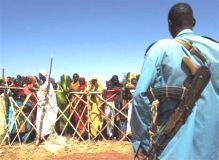Sudan govt, Darfur rebels sign pacts to end hostilities, aid refugees
By DANIEL BALINT-KURTI, Associated Press Writer
ABUJA, Nigeria, Nov 9, 2004 (AP) — Sudan and Darfur rebels signed fresh accords Tuesday to end hostilities and guarantee aid groups’ access to 1.6 million people uprooted by conflict in Sudan’s bloodied western region of Darfur.

|
|
A Sudanese policeman watches displaced Sudanese women waiting for food provided by the Saudi Relief Agency Tuesday, Nov. 9, 2004, in the el-Sereif refugee camp on the outskirts of Nyala town in Sudan’s western Darfur region. (AP). |
For the first time, Sudan agreed to the creation of “no-fly zones” over Darfur, banning military flights over rebel-held territories.
Rebels and African Union mediators had demanded the no-fly zones following widespread accusations of government bombings of villages.
“It is really a historical moment,” Sudanese spokesman Ibrahim Mohammed Ibrahim said. “We will do our most to make sure it is implemented on the ground. Only that will bring peace and stability to Darfurians.”
Sudan signed under international pressure, including threat of U.N. sanctions, after 21 months of conflict that have driven a total of 1.8 million people — most of them non-Arab villagers — into camps in Darfur and neighboring Chad.
The accords on security and humanitarian access came in the third week of talks in Nigeria’s capital, after two previous rounds of African Union-brokered talks failed without any agreements signed.
Nigerian President Olusegun Obasanjo _ current chairman of the African Union and the talks’ host _ praised the accord.
“There is no problem in Africa that we cannot solve if we in Africa are given the opportunity,” he said.
Obasanjo added that the African Union, which has more than 500 peacekeepers in Darfur, would “insist on the scrupuluous implementation of the agreement.”
“Future violations of the agreement … should not and will not be tolerated because too many Darfurians have suffered because of violations of the cease-fire agreement,” said Obasanjo.
Sudan and the Darfur rebels signed a cease-fire accord in Chad in April, which failed to hold.
Government and rebel delegates will remain in Abuja for at least one more day to try to reach a political accord with long-term solutions to the Darfur crisis, said Allam-Mi Ahmad, chief mediator at the talks.
Darfur’s bloodletting began in February 2003, when Sudan’s Arab-dominated government was accused of unleashing Arab tribal militias against non-Arab African farmers there after attacks by the two newly emerged rebel groups.
Sudanese warplanes are accused of backing the so-called Janjaweed in simultaneous raids. Sudan denies the accusation.
While no firm figure exists on the number of people killed directly by attacks, the World Health Organizations says more than 70,000 of the displaced people have died from disease, malnutrition and other hardships caused by being uprooted.
“My question is what is going to happen in practice,” said Mahgoub Hussain of the Sudan Liberation Army, the larger of two rebel groups signing Tuesday. “Because we’ve had … agreements like this in the past.”
